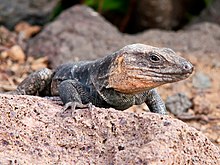Gran Canaria giant lizard
This article needs additional citations for verification. (June 2020) |
| Gran Canaria giant lizard | |
|---|---|

| |
| On Gran Canaria, Canary Islands, Spain | |
| Scientific classification | |
| Domain: | Eukaryota |
| Kingdom: | Animalia |
| Phylum: | Chordata |
| Class: | Reptilia |
| Order: | Squamata |
| Family: | Lacertidae |
| Genus: | Gallotia |
| Species: | G. stehlini
|
| Binomial name | |
| Gallotia stehlini (Schenkel, 1901)
| |
| Synonyms[2] | |

The Gran Canaria giant lizard (Gallotia stehlini) is a species of lizard in the family Lacertidae. The species is found in the Canary Islands.
Etymology
The specific name, stehlini, is in honor of Swiss paleontologist Hans Georg Stehlin, who collected the holotype.[3]
Description
G. stehlini grows to a total length (including tail) of up to 80 cm (31 in). It is among the largest reptiles within the family Lacertidae. The species comes in a variety of grays, browns, and reddish hues. Unlike their female counterparts, males exhibit sizable jowls, robust heads and overall greater body mass.[citation needed]
Diet
G. stehlini is a true omnivore. The young often consume various invertebrates, vegetation and soft fruits. As they mature, their diet largely consists of plant matter.[citation needed]
Geographic range
G. stehlini is endemic to Gran Canaria in the Canary Islands of Spain but it has been introduced to Fuerteventura.[1]
Habitat
The natural habitats of G. stehlini are temperate shrubland, Mediterranean-type shrubby vegetation, rocky areas, rocky shores, and pastureland, at altitudes from sea level to 1,850 m (6,070 ft).[1]
Reproduction
References
- ^ a b c Miras, Jose Antonio Mateo; Pérez-Mellado, Valentin; Martínez-Solano, Iñigo (2009). "Gallotia stehlini ". The IUCN Red List of Threatened Species. 2009: e.T61506A12494509. doi:10.2305/IUCN.UK.2009.RLTS.T61506A12494509.en.
- ^ a b Species Gallotia stehlini at The Reptile Database www.reptile-database.org.
- ^ Beolens, Bo; Watkins, Michael; Grayson, Michael (2011). The Eponym Dictionary of Reptiles. Baltimore: Johns Hopkins University Press. xiii + 296 pp. ISBN 978-1-4214-0135-5. (Gallotia stehlini, p. 252).
Further reading
- Cox, Siobhan C.; Carranza, Salvador; Brown, Richard P. (2010). "Divergence times and colonization of the Canary Islands by Gallotia lizards". Molecular Phylogenetics and Evolution 56 (2): 747–757. (corrigendum in 56: 1136).
- Hernández, E.; Nogales, M.; Martín, A. (March 2000). "Discovery of a New Lizard in the Canary Islands, with a Multivariate Analysis of Gallotia (Reptilia: Lacertidae)". Herpetologica. 56 (1). JSTOR 3893128.
- Schenkel, Ehrenfried (1901). "Achter Nachtrag zum Katalog der herpetologischen Sammlung des Basler Museums ". Verhandlungen der Naturforschenden Gesellschaft in Basel 13: 142–199. (Lacerta galloti var. stehlini, new variation, p. 187). (in German).
- Sindaco, Roberto; Jeremčenko, Valery K. (2008). The Reptiles of the Western Palearctic. 1. Annotated Checklist and Distributional Atlas of the Turtles, Crocodiles, Amphisbaenians and Lizards of Europe, North Africa, Middle East and Central Asia. (Monographs of the Societas Herpetologica Italica). Latina, Italy: Edizioni Belvedere. 580 pp. ISBN 978-88-89504-14-7.



